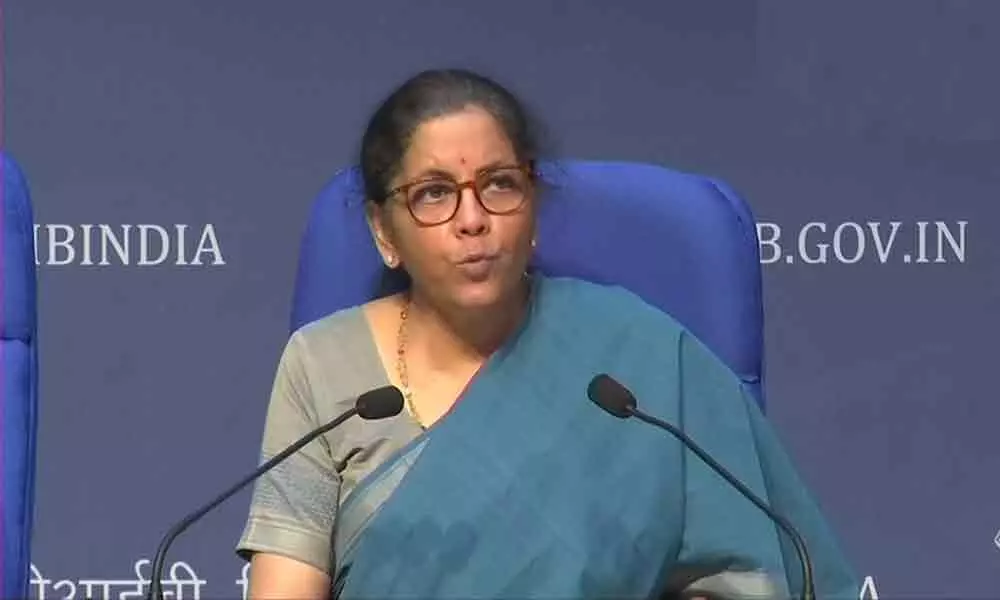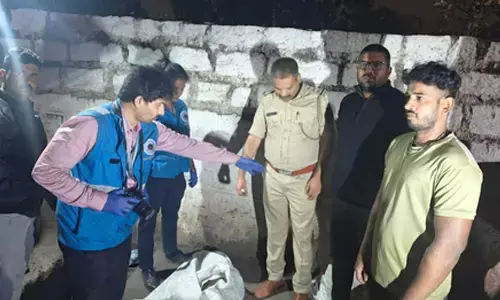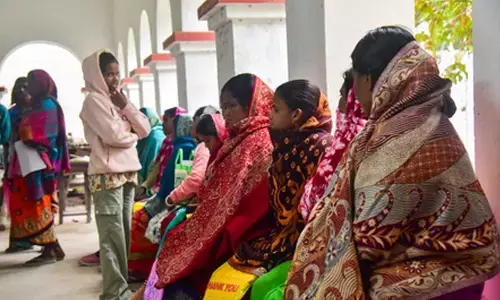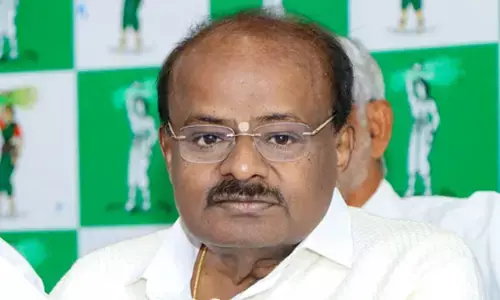FM Nirmala Sitharaman announced seven steps under the fifth tranche of Rs 20 Lakh Crore economic package
 Finance Minister Nirmala Sitharaman in her address to the press in New Delhi on Sunday
Finance Minister Nirmala Sitharaman in her address to the press in New Delhi on SundayFinance Minister Nirmala Sitharaman in her address to the press in New Delhi today, Sunday, announced the fifth tranche of Rs 20 lakh crore economic package that was announced by Prime Minister under the Atmanirbhar Bharat Abhiyan.
Finance Minister Nirmala Sitharaman in her address to the press in New Delhi today, Sunday, announced the fifth tranche of Rs 20 lakh crore economic package that was announced by Prime Minister under the Atmanirbhar Bharat Abhiyan.
At the start of the conference, FM Sitharaman said that the fifth tranche will focus on seven steps. She said in the last four days of announcements, we have had several reforms addressing the land, labour, liquidity and laws. Today's announcements will be continuing that series. She said seven steps will be taken regarding MNREGA, Healthcare (rural and urban) & education, Business during COVID-19, Decriminalisation of Companies Act, Ease of doing business, Public Sector Enterprises (PSUs) and related matters and State government and resources related to state governments.
Highlights of the Seven steps
MGNREGA
Additional Rs 40,000 crore allocated for MGNREGA to ensure the job security of workers during the monsoon season. The budget estimate was Rs 61,000 crores.
Healthcare & education
Public expenditure on the health sector has been increased under which investments in the grassroots levels will be ramped up in urban and rural areas. All districts will have infectious diseases blocks and public health labs will be set up in all districts at the block levels. Research by the National institutional platform for one health by ICMR will be encouraged. National digital health mission will be implemented. Besides, tech-driven education facility will be created for all. The government will launch the PM e-Vidya programme - a program for multi-mode access to digital education – and DIKSHA for digital education and one earmarked TV channel per class will also be a part of this. Radio community and podcast also be included. Special e-content will be created for Divyang children. Top 100 universities will automatically be allowed to start online courses by May 30, 2020.
Manodarpan: An initiative for psychological support of students, teachers and families for mental health and emotional well being to be launched immediately.
Business during COVID-19
A big boost has been given to the struggling businesses as the government has decided to exclude the debts related to COVID from default under IBC. No fresh insolvency case will be initiated for up to a year. For MSMEs, a special insolvency framework will be notified. The minimum threshold for insolvency has been raised to Rs 1 crore from Rs 1 lakh.
Decriminalisation of Companies Act
The government has decided to decriminalise Companies Act defaults and seven compoundable offences altogether have been dropped and five to be dealt with under alternative framework. Internal adjudicating mechanism route will be set up to reduce the burden on criminal courts and NCLT.
Decriminalization of companies act defaults involving minor technical and procedural violations. Majority of the compoundable offences sections to be shifted to internal adjudication mechanism and powers of RD for compounding enhanced.
Ease of doing business
The government will allow companies to directly list their securities in a foreign jurisdiction. Private companies listing non-convertible debentures (NCDs) on the stock exchange not to be regarded as listed companies.
PSUs and policies
A new Public Sector Enterprise (PSE) Policy will be introduced in the Parliament. The government will notify strategic sectors where at least one PSE will be present while private players will also be allowed to participate. In other sectors, PSEs will be privatised. To minimize wasteful administrative costs, the number of enterprises in strategic sectors will not be more than four, others. If there are more PSUs in any sector, they will be merged together, or they will be brought in such a way that there are only four or lesser.
State Government and resources
States have so far borrowed only 14 per cent of the limit authorised, 86 per cent of the authorised borrowing remains unutilized. The central government extends more support to the state governments. Revenue deficit grants to the states of Rs 12,390 crore given to states in April to May period despite the financial crisis, devolution of taxes of Rs 46,038 in April given fully.
The states have seen a sharp decline in the revenue, we have consistently extended help to the states. Revenue Deficit Grants to states of Rs 12,390 crores was given on time in April&May despite Centre's stressed resources; devolution of taxes of Rs 46,038 in April given fully:FM pic.twitter.com/ksJaTICmp7
— ANI (@ANI) May 17, 2020
The borrowing limits of states have been increased from 3 per cent of SGDP to 5 per cent SGDP. This will allow states to borrow an additional amount of Rs 4.28 lakh crore as extra resources. Part of the borrowing will be linked to specific reforms namely One Nation One Ration Card, Ease of Doing Business, power distribution and urban local body revenues.
A specific scheme will be notified by the Department of Expenditures along with the following pattern:
Unconditional increase of 0.50 per cent
One per cent in 4 tranches of 0.25 per cent with each tranche linked to clearly specified, measurable and feasible reform actions
Further, 0.50 per cent of milestones are achieved in at least three out of four reform areas
Finance Minister Nirmala Sitharaman provides tranche-wise breakup of the Rs 20 lakh crore economic package. Here's the break-up.
Earlier measures: Rs 1,92,000 crore
Tranche 1: Rs 5,94,550 crore, including 3 lakh crore emergency working capital facility for MSMEs, business and Rs 90,000 crore liquidity infusion for Discoms.
Tranche 2: Rs 3,10,000 crore, including Kisan Credit Card additional credit Rs 2 lakh crore
Tranche 3: Rs 1,50,000 crore, including Rs 1 lakh crore agriculture infrastructure fund
Tranche 4+5: Rs 48,100 crore, including Rs 40,000 crore additional spending on MNREGA.
RBI measures: Rs 8,01,603 crore
Total: 20,97,053 crore
In the first four sets of measures, the Finance Minister liberalised coal, minerals and mining sectors; addressing the issue of migrant labour, street vendor issues, allowed for major agriculture sector reforms; MSME and pumped in liquidity, among others. Details of the previous four tranches:
Tranche 1: The announcements were made on May 13, 2020, and included six measures for MSMEs, 2 for NBFCs and MFIs, 2 for EPF, 1 for Discoms, 1 for contractors, 1 for real estate sector, and 3 tax measures
Tranche 2: The announcements were made on May 14, 2020, and had a focus on migrant workers, street vendors, small traders, self-employed people and small farmers.
Tranche 3: The announcements were made on May 15, 2020, and it outlined measures for the agriculture and allied sectors, with a focus on small and marginal farmers.
Tranche 4: The announcements were made on May 16, 2020, and it had a focus on sectoral reforms pertaining to mining, aviation, airspace management, airports and MROs, defence production, space and atomic energy.
Prime Minister Narendra Modi had on May 12, 2020, announced a Rs 20 lakh crore economic stimulus package and said that said package is almost 10 per cent of India's gross domestic product (GDP). The package was aimed at aiding the country as it battles the economic effects of the coronavirus, COVID-19, pandemic.
















